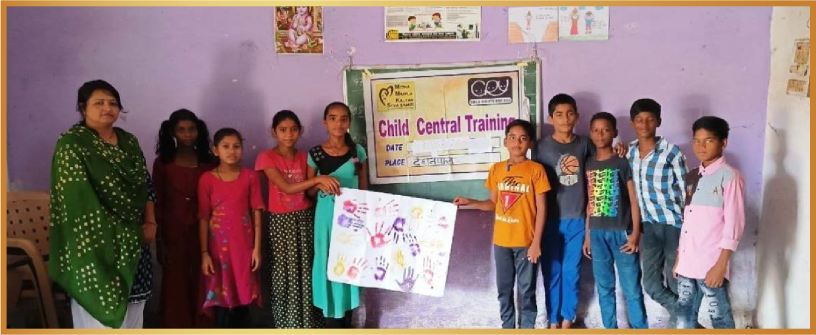Persuading for Progress: Tinki’s Journey to Education

Tinki lived with her family in the urban slum of Bilaspur. She was a bright and curious eighth grader at a government school located a few kilometers away from her home. Tinki loved learning and was always eager to attend the Child and Adolescent Resource Centre (CARC) situated nearby. The center provided additional educational support to students like her who lived in disadvantaged areas.
However, due to their poor financial condition, Tinki and her family had to move to a new slum, which was also a couple of kilometers away from her school and the CARC. Sadly, Tinki stopped attending the CARC. Worried about her absence, the CARC teacher visited her new home to inquire about her sudden absence..
Upon meeting her family, the teacher discovered that the increased distance and late evening hours were preventing Tinki from attending the CARC. However, when the teacher talked to her, she revealed that she wanted to attend the classes, but her family was not allowing her to go. The teacher then visited her family for a couple more days, discussing education and the importance of her attendance at the CARC.
Finally, after much persuasion, her parents were convinced of the value of the center and agreed to let their daughter attend it regularly. Now, Tinki is once again attending classes at the CARC, excited to continue learning and growing as a student.
The Problem
Bilaspur is a region in Chhattisgarh where education is a huge problem faced by the communities living there. Lack of access to quality education and infrastructure results in children dropping out of school and getting involved in child labor. The pandemic worsened the situation as children began facing issues with digital learning coupled with increased financial burden on the family. Thus resulting in children dropping out of school.
The Solution
CRY America’s Project MMKSS works towards creating children’s collectives, sensitizing the School Management Committee (SMCs), ensuring children in the age of 3 to 6 years attend preschool, and teacher learning support is provided to teachers. The key activities under the project are linking children with scholarship schemes, vulnerability mapping and work regarding installation of kitchen gardens in model schools and Anganwadi Centers.
Impact of the Project
● 120 meetings of community based organizations organized
● 230 meetings of children collectives held
● 372 children linked with scholarship schemes
● 132 children in 3-6 years were enrolled in AWCs for pre-school
● 5 dropout children in 6-14 years enrolled in school

2023 Plans
● Sensitization of 144 School Management Committee (SMC) members on child rights issues and regular meetings
● Retaining 312 children in Anganwadi centers
● Ensure enrolment of 44 drop out children through open school
● Ensure grade transition of 412 children
● Ensure 40 adolescents girls enroll for college
● Ensure linkage of 20 adolescents with the government sports coaching program
2022 Grant Disbursed – $19,016
2023 Budget













